
|
March 2009 Volume 15, Number 1
|
Back Issues:
http://solarcooking.org/docs.htm |
In this Issue:
|
|
[Editor's note: "News you send" is compiled by Tom Sponheim and Kevin Porter, Solar Cookers International's information exchange specialists. E-mail your news items to info@solarcookers.org or send postal mail to Kevin Porter, Solar Cookers International, 1919 21st Street #101, Sacramento, California 95811-6827, USA. We want to hear from you — especially if your program is growing or if your work has not been featured in the Solar Cooker Review before. Please include your contact information. Submissions are subject to editing if printed.]
Mozambique
 Mozambique
Association for Urban Development (AMDU) conducted a number of solar cooking
courses and exhibits over the past several months, according to reports from
AMDU President
Maria dos Anjos
Rosario and Dutch volunteer
Anneke Hudig. Among
its many accomplishments, AMDU conducted a series of three-week solar cooker
construction and training courses in Maputo for 50 impoverished youth. These
courses coincided with public solar cooking exhibitions, and were covered by
local television media. A series of public demonstrations in Maputo drew large
crowds, witnessing dozens of different solar cookers on display. At the 5th
Mozambican Exhibition of Science and Technology, AMDU presented a 10-day workshop
that taught youth how to make solar cookers out of recycled materials and how
those cookers can efficiently use solar energy to cook food. More recently,
AMDU has introduced an alternative energy program in three neighborhoods of
Mocuba and 10 rural villages in the province of Zambezia. An early component
of these programs was a solar cooker competition involving 40 participants from
the various program areas. Solar cooking confidence was apparent among the contestants.
The AMDU resource center in Hulene suburb of Maputo has been converted into
an alternative energy center where youth can learn, experiment, and teach others
about solar energy and recycling programs. Contact:
Maria dos Anjos
Rosario, Avenue Julius Nyerere 562, Maputo,
Mozambique. E-mail:
anjos@tvcabo.co.mz
Mozambique
Association for Urban Development (AMDU) conducted a number of solar cooking
courses and exhibits over the past several months, according to reports from
AMDU President
Maria dos Anjos
Rosario and Dutch volunteer
Anneke Hudig. Among
its many accomplishments, AMDU conducted a series of three-week solar cooker
construction and training courses in Maputo for 50 impoverished youth. These
courses coincided with public solar cooking exhibitions, and were covered by
local television media. A series of public demonstrations in Maputo drew large
crowds, witnessing dozens of different solar cookers on display. At the 5th
Mozambican Exhibition of Science and Technology, AMDU presented a 10-day workshop
that taught youth how to make solar cookers out of recycled materials and how
those cookers can efficiently use solar energy to cook food. More recently,
AMDU has introduced an alternative energy program in three neighborhoods of
Mocuba and 10 rural villages in the province of Zambezia. An early component
of these programs was a solar cooker competition involving 40 participants from
the various program areas. Solar cooking confidence was apparent among the contestants.
The AMDU resource center in Hulene suburb of Maputo has been converted into
an alternative energy center where youth can learn, experiment, and teach others
about solar energy and recycling programs. Contact:
Maria dos Anjos
Rosario, Avenue Julius Nyerere 562, Maputo,
Mozambique. E-mail:
anjos@tvcabo.co.mz
Somalia / United States
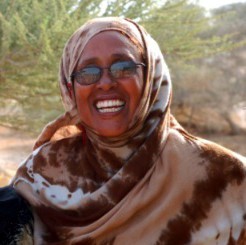 Fatima
Jibrell, co-founder of the
Sun Fire Cooking
organization, received the
2008 National Geographic Society/Buffett Award for Leadership in African Conservation.
She was honored for her “outstanding work and lifetime contributions that further
the understanding and practice of conservation.” Among Jibrell’s many accomplishments
are her efforts to reduce soil erosion through the promotion of rock dams, her
activism towards reducing Somalia’s
illicit charcoal trade, and her leadership in the formation of a cross-clan,
cross-regional resource management network in Somalia and Somaliland. Since
co-founding Sun Fire Cooking in 2004, Jibrell has been instrumental in providing
solar cookers and training to villagers in the Sanaag district of Somalia, including
nearly 1,000 in the coastal village of Bender Bayla. Contact:
Fatima Jibrell, Sun
Fire Cooking, Horn Relief Building, Bosaso, Somalia. Tel: 252 5 824296 or 252
5 797844, e-mail: sunfirecooking@yahoo.com,
Web: http://sunfirecooking.com; more
information about the award is available on-line at
http://blogs.nationalgeographic.com/blogs/news/chiefeditor/2008/12/conservation-heroes.html
Fatima
Jibrell, co-founder of the
Sun Fire Cooking
organization, received the
2008 National Geographic Society/Buffett Award for Leadership in African Conservation.
She was honored for her “outstanding work and lifetime contributions that further
the understanding and practice of conservation.” Among Jibrell’s many accomplishments
are her efforts to reduce soil erosion through the promotion of rock dams, her
activism towards reducing Somalia’s
illicit charcoal trade, and her leadership in the formation of a cross-clan,
cross-regional resource management network in Somalia and Somaliland. Since
co-founding Sun Fire Cooking in 2004, Jibrell has been instrumental in providing
solar cookers and training to villagers in the Sanaag district of Somalia, including
nearly 1,000 in the coastal village of Bender Bayla. Contact:
Fatima Jibrell, Sun
Fire Cooking, Horn Relief Building, Bosaso, Somalia. Tel: 252 5 824296 or 252
5 797844, e-mail: sunfirecooking@yahoo.com,
Web: http://sunfirecooking.com; more
information about the award is available on-line at
http://blogs.nationalgeographic.com/blogs/news/chiefeditor/2008/12/conservation-heroes.html
Sudan
 The
United Nations Industrial Development Organization (UNIDO) is partnering with
UNICEF and the
International Organization for Migration (IOM), a leading inter-governmental
organization with offices in over 100 countries, to introduce solar cookers
to internally displaced persons (IDPs) in South Darfur,
Sudan. Based on input
from a survey conducted by UNIDO, a prototype solar box cooker was developed
and tested with women’s groups in Khartoum. For the pilot phase of the project,
10 ethnically diverse women from El Serief IDP camp learned how to use the solar
cookers during three days of training. (El Serief is home to approximately 13,000
IDPs from 21 ethnic groups.) The training culminated with successfully solar
cooking several traditional dishes. Eight of the 10 women continued to regularly
use their solar cookers after a month-long trial, with several hoping to cook
not only for their families but also to bake goods for sale. According to the
IOM Sudan Newsletter, one of the 10 women — Ms. Hawa Abker, who has lived
at El Serief since 2005 — reported being happy about her solar cooker because
she spends less money on charcoal and firewood for cooking. “I am saving two
Sudanese pounds per day,” she says. IOM and UNICEF plan to scale up the project,
hoping to reach an additional 500 women during the months following the pilot
phase. A primary goal of the project is to reduce sexual and gender-based violence
against women and girls that are vulnerable while collecting firewood away from
the camp. Contact: Simona Opitz, Public Information Officer,
International Organization for Migration, Amarat, Street 47,
Block 11, House 18, Khartoum,
Sudan. Tel: +249
183 570801/2/3/4 (Ext 250), e-mail:
sopitz@iom.int, Web: http://iom.int
The
United Nations Industrial Development Organization (UNIDO) is partnering with
UNICEF and the
International Organization for Migration (IOM), a leading inter-governmental
organization with offices in over 100 countries, to introduce solar cookers
to internally displaced persons (IDPs) in South Darfur,
Sudan. Based on input
from a survey conducted by UNIDO, a prototype solar box cooker was developed
and tested with women’s groups in Khartoum. For the pilot phase of the project,
10 ethnically diverse women from El Serief IDP camp learned how to use the solar
cookers during three days of training. (El Serief is home to approximately 13,000
IDPs from 21 ethnic groups.) The training culminated with successfully solar
cooking several traditional dishes. Eight of the 10 women continued to regularly
use their solar cookers after a month-long trial, with several hoping to cook
not only for their families but also to bake goods for sale. According to the
IOM Sudan Newsletter, one of the 10 women — Ms. Hawa Abker, who has lived
at El Serief since 2005 — reported being happy about her solar cooker because
she spends less money on charcoal and firewood for cooking. “I am saving two
Sudanese pounds per day,” she says. IOM and UNICEF plan to scale up the project,
hoping to reach an additional 500 women during the months following the pilot
phase. A primary goal of the project is to reduce sexual and gender-based violence
against women and girls that are vulnerable while collecting firewood away from
the camp. Contact: Simona Opitz, Public Information Officer,
International Organization for Migration, Amarat, Street 47,
Block 11, House 18, Khartoum,
Sudan. Tel: +249
183 570801/2/3/4 (Ext 250), e-mail:
sopitz@iom.int, Web: http://iom.int
Togo
The environment association
Jeunes Volontaires pour l’Environnement (JVE) taught over 150 people how
to build and use solar cookers over the past year and a half. During a general
assembly meeting in late 2007, about 100 participants from several cities in
Togo,
Côte d'Ivoire
and Benin gathered for
a workshop in Notse. Over the course of three days, participants learned basic
solar cooking concepts and skills, participated in the construction of their
own solar CooKits, gained
valuable management skills, and heard testimony from JVE project participants
about the man y
benefits solar cookers have brought to their lives. One such testimony came
from a women involved with a JVE solar water pasteurization project in the Vo
prefecture. She discussed how solar cooker use has reduced the number of pulmonary
illnesses in the community, and how pasteurization skills have similarly lessened
the incidence of waterborne disease. She also spoke vividly about how her status
in the community had changed because of her involvement with the project, so
much so that the chief now refers all issues of natural resources management
to her — an example, she says, of how the role of women in the community is
elevated with empowering projects like these. In August, 2008, JVE organized
Operation Amis du Soleil, a five-day gathering in the Casablanca quarter of
Lome that brought together dozens of people, mostly youth, to learn about solar
cooker use and to build solar cookers for JVE’s solar water pasteurization project
in Vo prefecture. (Eleven women’s groups in Vo produce solar cookers, but they
are not always able to keep up with demand.) Contact: Sena Alouka, executive
director, Jeunes Volontaires pour l’Environnement, 131, Rue Ofe, Tokoin Casablanca,
Box 8823, Lome, Togo. Tel: +228-2200112, e-mail:
yvetogo@hotmail.com,
Web: http://ong-jve.org
y
benefits solar cookers have brought to their lives. One such testimony came
from a women involved with a JVE solar water pasteurization project in the Vo
prefecture. She discussed how solar cooker use has reduced the number of pulmonary
illnesses in the community, and how pasteurization skills have similarly lessened
the incidence of waterborne disease. She also spoke vividly about how her status
in the community had changed because of her involvement with the project, so
much so that the chief now refers all issues of natural resources management
to her — an example, she says, of how the role of women in the community is
elevated with empowering projects like these. In August, 2008, JVE organized
Operation Amis du Soleil, a five-day gathering in the Casablanca quarter of
Lome that brought together dozens of people, mostly youth, to learn about solar
cooker use and to build solar cookers for JVE’s solar water pasteurization project
in Vo prefecture. (Eleven women’s groups in Vo produce solar cookers, but they
are not always able to keep up with demand.) Contact: Sena Alouka, executive
director, Jeunes Volontaires pour l’Environnement, 131, Rue Ofe, Tokoin Casablanca,
Box 8823, Lome, Togo. Tel: +228-2200112, e-mail:
yvetogo@hotmail.com,
Web: http://ong-jve.org
LATIN AMERICA AND IBERIA
Argentina
 Ariel
Lerda and Abel Diaz
have developed Spanish-language construction plans for a modified version of
Teong Tan’s
Double-Angled-Twelve-Sided
(DATS) solar cooker, which was originally featured in the March 2002 Solar Cooker
Review. Their modifications includes an alternative pot support structure and
a method of assembly that allows for more compact storage of the cooker. Lerda
and Diaz also offer tips for making this and other cardboard solar cookers more
durable and weather resistant. Like the original DATS, this version is comprise
Ariel
Lerda and Abel Diaz
have developed Spanish-language construction plans for a modified version of
Teong Tan’s
Double-Angled-Twelve-Sided
(DATS) solar cooker, which was originally featured in the March 2002 Solar Cooker
Review. Their modifications includes an alternative pot support structure and
a method of assembly that allows for more compact storage of the cooker. Lerda
and Diaz also offer tips for making this and other cardboard solar cookers more
durable and weather resistant. Like the original DATS, this version is comprise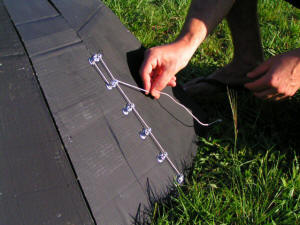 d
of 12 foil-lined cardboard panels, each with a slight bend about three-fifths
of the way down, connected in a circular manner to form a shape similar to a
parabola. Instead of permanently connecting the 12 panels, Lerda and Diaz opted
to hinge them in an inside-outside alternating fashion using pieces of glued
fabric, leaving the last panel unhinged but with a series of connectors that
can be cinched together with string. This allows the cooker to be folded up
accordion style when not in use. The mechanism for cinching together the base
of the panels has also been modified. Whereas in the original DATS design the
lower, narrow ends of the panels had two “ears” with holes punched in them through
which a cinching string was pulled,
d
of 12 foil-lined cardboard panels, each with a slight bend about three-fifths
of the way down, connected in a circular manner to form a shape similar to a
parabola. Instead of permanently connecting the 12 panels, Lerda and Diaz opted
to hinge them in an inside-outside alternating fashion using pieces of glued
fabric, leaving the last panel unhinged but with a series of connectors that
can be cinched together with string. This allows the cooker to be folded up
accordion style when not in use. The mechanism for cinching together the base
of the panels has also been modified. Whereas in the original DATS design the
lower, narrow ends of the panels had two “ears” with holes punched in them through
which a cinching string was pulled,
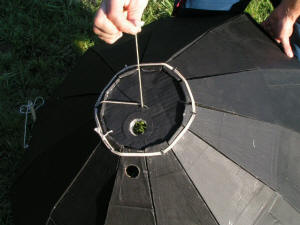 Lerda
and Diaz instead incorporate a series of wires attached to a base plate that
protrude
Lerda
and Diaz instead incorporate a series of wires attached to a base plate that
protrude
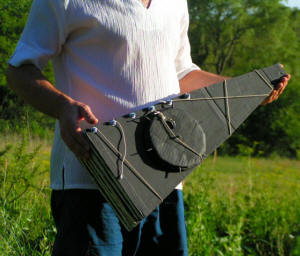 through
the panels in such a way that a string can be cinched around them, eliminating
the need for the ears. To increase strength and durability of cardboard, Lerda
and Diaz recommend gluing durable fabric around exposed ends, placing wire between
the fabric and cardboard on ends that will be particularly susceptible to damage.
They also suggest that gluing two pieces of corrugated cardboard together with
the corrugations perpendicular to each other is a simple way to add strength.
Construction plans for this and many other cookers are available on the SCI-sponsored
Solar Cooking Archive. Look for the
“collapsible parabolic cooker” on the plans page at
http://solarcooking.org/plans/default.htm.
Contact Ariel Lerda by e-mail:
elari@tutopia.com.
through
the panels in such a way that a string can be cinched around them, eliminating
the need for the ears. To increase strength and durability of cardboard, Lerda
and Diaz recommend gluing durable fabric around exposed ends, placing wire between
the fabric and cardboard on ends that will be particularly susceptible to damage.
They also suggest that gluing two pieces of corrugated cardboard together with
the corrugations perpendicular to each other is a simple way to add strength.
Construction plans for this and many other cookers are available on the SCI-sponsored
Solar Cooking Archive. Look for the
“collapsible parabolic cooker” on the plans page at
http://solarcooking.org/plans/default.htm.
Contact Ariel Lerda by e-mail:
elari@tutopia.com.
NORTH AMERICA AND EUROPE
United States
 ClearDome
Solar Thermal describes its newest solar cooker as a “deep-tapered parabolic
concentrator.” Though not a true parabola, the
Octagon Parabolic
Solar Cooker wraps around a cooking vessel and reflects sunlight onto a
cooking area approximately 11 inches in diameter. The reflective panel is attached
to the cooker base at two pivot points, and can be adjusted up or down for virtually
any sun angle. It is made from
ClearDome
Solar Thermal describes its newest solar cooker as a “deep-tapered parabolic
concentrator.” Though not a true parabola, the
Octagon Parabolic
Solar Cooker wraps around a cooking vessel and reflects sunlight onto a
cooking area approximately 11 inches in diameter. The reflective panel is attached
to the cooker base at two pivot points, and can be adjusted up or down for virtually
any sun angle. It is made from a weather-resistant, anodized aluminum material called SolaReflex AA that ClearDome
says is 95.5% reflective and has an expected lifespan of 15-20 years. The Octagon
is collapsible and weighs about six pounds. In a cooker review for the Yahoo!
SolarCooking group, Chris Smith of Idaho was quite impressed with the design
and performance of the cooker. “I could begin cooking a rice and vegetable casserole
before 8 a.m.,” Smith said, adding that potatoes were successfully baked before
noon and that “several nice boneless chicken fillets in a chipotle chili sauce
[took] about an hour.” Contact: ClearDome Solar Thermal, 3368 Governor Drive,
153-F, San Diego, California 92122, USA. Tel: 619-990-7977, e-mail:
cleardomesolar@sbcglobal.net,
Web: http://cleardomesolar.com
a weather-resistant, anodized aluminum material called SolaReflex AA that ClearDome
says is 95.5% reflective and has an expected lifespan of 15-20 years. The Octagon
is collapsible and weighs about six pounds. In a cooker review for the Yahoo!
SolarCooking group, Chris Smith of Idaho was quite impressed with the design
and performance of the cooker. “I could begin cooking a rice and vegetable casserole
before 8 a.m.,” Smith said, adding that potatoes were successfully baked before
noon and that “several nice boneless chicken fillets in a chipotle chili sauce
[took] about an hour.” Contact: ClearDome Solar Thermal, 3368 Governor Drive,
153-F, San Diego, California 92122, USA. Tel: 619-990-7977, e-mail:
cleardomesolar@sbcglobal.net,
Web: http://cleardomesolar.com
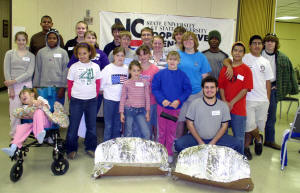 In
the summer of 2007, Luke
Hill – then age 13 – earned first place in the North Carolina state 4-H
competition for his presentation about solar cookers. He discussed why solar
cookers are important, how to build them and how to use them, and displayed
three different models of solar cookers. After this success, Hill approached
his county 4-H office with a community service project proposal to build solar
cookers for the developing world. Over 20 youth collaborated on this project,
building a total of 11 solar cookers that would later be sent to
South Africa by
a local Baptist men’s association. Special guest speakers from South Africa
told the youth about life in South Africa, and the daily struggle that many
families go through just to cook their food or get health care services. Contact
Kelli Hill, Luke’s mother, by e-mail:
kellirandy@yahoo.com.
In
the summer of 2007, Luke
Hill – then age 13 – earned first place in the North Carolina state 4-H
competition for his presentation about solar cookers. He discussed why solar
cookers are important, how to build them and how to use them, and displayed
three different models of solar cookers. After this success, Hill approached
his county 4-H office with a community service project proposal to build solar
cookers for the developing world. Over 20 youth collaborated on this project,
building a total of 11 solar cookers that would later be sent to
South Africa by
a local Baptist men’s association. Special guest speakers from South Africa
told the youth about life in South Africa, and the daily struggle that many
families go through just to cook their food or get health care services. Contact
Kelli Hill, Luke’s mother, by e-mail:
kellirandy@yahoo.com.
United States / Kenya / Uganda
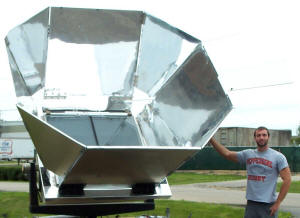 Indiana
native Dusty Breeding
first visited Africa in 2006, working with orphans and other malnourished children.
He was so moved by the heartbreaking conditions he experienced that he decided
to put his culinary arts background to use to help the children learn to bake
bread for their own nourishment and to help lift themselves out of poverty.
The nonprofit organization Breeding founded,
LifeBread, Inc.,
is dedicated to empowering the people of impoverished nations through nutritional
education and food preparation training as a means to curb the severity of world
hunger. Breeding is enthusiastic about the use of solar ovens in his programs,
and hopes to eventually equip an orphanage with a large commercial model capable
of baking 400 loaves of bread daily. During one trip to
Uganda, Breeding planned
to use a solar oven made out of a 50-gallon drum to help students bake rolls
for 200 campers. Contact: Dusty Breeding, director, LifeBread, Inc., 568 N.
Jackson Street, Andrews, Indiana 46702, USA. Tel: 256-655-0584, e-mail:
dusty@lifebread.org,
Web: http://www.lifebread.org
Indiana
native Dusty Breeding
first visited Africa in 2006, working with orphans and other malnourished children.
He was so moved by the heartbreaking conditions he experienced that he decided
to put his culinary arts background to use to help the children learn to bake
bread for their own nourishment and to help lift themselves out of poverty.
The nonprofit organization Breeding founded,
LifeBread, Inc.,
is dedicated to empowering the people of impoverished nations through nutritional
education and food preparation training as a means to curb the severity of world
hunger. Breeding is enthusiastic about the use of solar ovens in his programs,
and hopes to eventually equip an orphanage with a large commercial model capable
of baking 400 loaves of bread daily. During one trip to
Uganda, Breeding planned
to use a solar oven made out of a 50-gallon drum to help students bake rolls
for 200 campers. Contact: Dusty Breeding, director, LifeBread, Inc., 568 N.
Jackson Street, Andrews, Indiana 46702, USA. Tel: 256-655-0584, e-mail:
dusty@lifebread.org,
Web: http://www.lifebread.org
Program collaborations and growth in eastern Africa
by Karyn Ellis, SCI director of international program development


Opportunities for collaboration
Solar Connect Association
(SCA) is the leading solar and integrated cooking organization in
Uganda.
SCI worked with SCA last
summer on an integrated cooking workshop in Obia. A follow-up workshop is planned
for August, with assistance from volunteers Mary Lou Ozimek and her son
Max. SCI and SCA
plan to collaborate on a safe water and integrated cooking workshop in 2010
for Uganda’s NGOs and government officials. Peace Corps Uganda is expanding
its alternative energy programs for volunteer outreach in Uganda. Solar cooking
and water
pasteurization skills will be incorporated into a training program in the
near future. I have no doubt that solar cooking and safe water projects will
take off with volunteer programs, and that demand for our services will increase
steadily.
Disabled Technicians of Uganda (DTU) has been implementing solar cooking
and solar food drying projects for disabled and disadvantaged people for many
years in Uganda. DTU’s most recent initiative targets displaced families, living
in camps, who use bio-fuels as their primary source of energy. DTU is interested
in program planning and project development collaborations with SCI.
United Religions Initiative (URI) is a youth-based organization that has
been working globally on environmental, community and conflict resolution issues
since 2000. URI is keen to incorporate solar cooking into its community and
environmental programs, and has offered to facilitate contacts between SCI and
local environmental and governmental organizations.
World Concern
is a global organization that works to eradicate poverty and hunger, promote
community development, dig wells and provide clean drinking water. Dr. Valery
Shean developed an influential resettlement project in the disrupted village
of Karamoja, in northeastern Uganda, and will incorporate solar cooking and
water pasteurization into reformatory p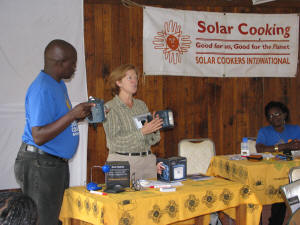
Tanzania workshop

For photos and updates on this trip and others, visit SCI’s international program development blog at http://www.solarcookers.org/programs/ipdblog.html
Message from the executive director
Dear SCI Friends, The rain and drizzle here in California has given way to sunny skies again and we are back to solar cooking. My first choices after the rains are red beans, cilantro and onions. News from the United Nations included a declaration of March 22nd as World Water Day. The purpose of the recognition is to remind us that concrete efforts to promote clean drinking water are being made throughout the world and we can help to increase awareness and solutions to this issue. This year’s focus in on boundary waters. Just as we are all connected in that we share and benefit from the abundant energy of the sun, we also in most cases share boundaries with other countries made by bodies of water such as rivers and lakes. Through our programs we are reminded that the waters we share with others are essential to our lives and there is a joint responsibility to care for them. The significance of clean potable water is highlighted in the following examples:
- In Kenya, where we have worked for over ten years, lack of safe water and sanitation account for 40% of hospital admissions.
- In Tanzania, municipal health officials reported a significant decrease in outbreaks of cholera, typhoid, dysentery and diarrhea because of water testing and water pasteurization.

In Geneva and New York, SCI advocates and UN representatives are making their voices heard:
- Joyce Jett, in Geneva, serves with the Working Group on Displaced Women (refugees, internally displaced persons, migrants and trafficked women).
- Sonia Heptonstall, also in Geneva, just had a statement added to the Women’s International League for Peace and Freedom public announcement that declares “Major health improvements would occur immediately if governments took heed of simple water pasteurization techniques and made them generally accessible to the public.”
- In New York, SCI board member A.J. Lederman presented a three-minute statement at the UN that urged greater use of solar energy for cooking and water pasteurization.
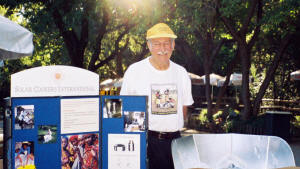 In
Sacramento (USA), SCI volunteers connect with people in other parts of the world:
In
Sacramento (USA), SCI volunteers connect with people in other parts of the world:
- Jerry Plummer, a volunteer in our office, recently worked with the Mira Loma High School Interact Club and the Southside Art Center to assemble and package Water Pasteurization Indicators (WAPIs) for shipment to Spanish-speaking countries.
- Volunteers Debbie and Bill Hudson helped to insert instructions in packages, and with Don Coan prepared solar cooker kits for shipping abroad.
In Nairobi, SCI is providing solar cookers and technical advice to individuals and organizations:
-
Margaret Owino will meet with a lady from Ethiopia who contacted us on-line for assistance to improve the quality of solar cookers that she is now producing.
-
Representatives of the Danish Refugee Council are having solar cookers produced in Nairobi through SCI for use by refugees in Sudan.
In fulfilling the mission of SCI, these individuals also help to make lives better. They are much appreciated. At present, our staff is working on an exciting project — the next five year strategic plan. The focus is on advocacy, humanitarian assistance, education resources and international program development. If you have some thoughts on these issues, please send me an e-mail: patrick@solarcookers.org. I hope the skies are sunny where you are, and that you are enjoying solar cooking with friends and family. Be well, and thank you for promoting these simple, magnificent technologies that are healthy and environmentally friendly.
Patrick T. Widner SCI executive director
Proposed CDM projects would distribute 34,000 solar cookers in China
China's Ningxia Federal Intertrade Company has submitted Clean Development Mechanism (CDM) proposals to disseminate 34,000 solar cookers in Ningxia Hui Autonomous Region, aimed at reducing the amount of CO2 released from coal-fired stoves. According to the United Nations Framework Convention on Climate Change (UNFCCC), CDM “allows emission-reduction projects in developing countries to earn certified emission reduction (CER) credits, each equivalent to one ton of CO2. These CERs can be traded and sold, and used by industrialized countries to a meet a part of their emission reduction targets under the Kyoto Protocol. The mechanism stimulates sustainable development and emission reductions, while giving industrialized countries some flexibility in how they meet their emission reduction limitation targets.” The solar cooker CERs would be purchased by the Netherlands through Swiss Re Global Markets Limited at an estimated value of 8.65 EUR (or about $11) each, providing necessary project implementation funds. The two projects have gone through the validation process and are currently under review by the CDM executive board.
The first project — UNFCCC # 2307 — would provide solar cookers to 17,000 poor rural families in the mountainous northern Pengyang County townships of Luowa, Jiaocha, Wangwa, Xiaocha, Fengzhuang, Caomiao and Mengyuan. (This represents 83.6% of all households in the region.) The second project — UNFCCC # 2311 — would provide solar cookers to 17,000 poor rural families in the Hong-Ru River area of southern Pengyang County, in the townships of Baiyang, Gucheng, Xinji, Chengyang and Honghe. (This represents 56.4% of all households in the region.)
According to the project design document (PDD), the rural Pengyang region “is an ideal region for utilizing solar energy. Located at high altitude, this region has many sunny days. It is one of the most suitable regions in China for utilizing solar energy.” The project will benefit the participating communities and surrounding areas in a number of ways, according to the PDD. “The proposed project will significantly contribute to sustainable development of this region. It will serve as a model for future projects and stimulate the interests of investors in solar energy projects. It will promote the use of clean energy, educate and train the rural population on solar energy technology, and build awareness in environmental protection among the rural population. … The poor rural residents will get clean and reliable energy supply for their daily cooking.”
The projects will be monitored by the Rural Energy Section (RES) of China’s
Bureau of Agriculture, Graze and Science & Technology, under the supervision
of Ningxia Federal Intertrade. RES will recruit and train local CDM groups of
one to five people to collect and record monitoring data from five to 20 households
each. Sampling surveys will be employed to determine annual solar cooker hours
of operation as follows: a statistically significant number of households, 309
for each project, will be randomly selected each year; CDM groups will record
daily solar cooker use for each sample household, with monthly totals to be
checked for completeness and accuracy by Ningxia Federal Intertrade; at least
once per month, each CDM group will spend an entire day with one family and
monitor the solar cooker use in detail.
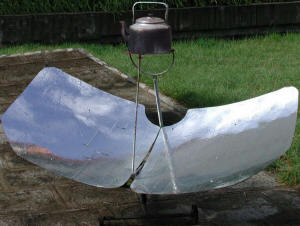
Each participating household would pay a small project implementation fee of 30 Chinese Yuan (CNY), or about $4.40. This fee represents roughly one-tenth the value of the cooker, and includes free maintenance over the 10-year life of the project. Based on China’s national GB standard NY/T219-2003, this style of solar cooker has a power rating of 773.5 watts. Project planners determined traditional coal-fired stoves to have a thermal efficiency of approximately 15%, while calculating thermal efficiency of the solar cookers to be about 65%. Studies show that the solar cookers would need to be used at least four hours per day to meet the daily cooking and water heating needs of a typical target family, so the monthly usage is calculated to be 120 hours. After factoring in the monthly solar irradiance rates for the region, as well as other solar cooker design parameters, it is estimated that the two projects will each produce 35,723 tCO2e (tons of carbon dioxide equivalent) emission reductions per year, or 357,230 tCO2e over the 10-year project.
Ningxia Federal Intertrade has also signed an emission reduction purchase agreement with Finland, according to the Ministry for Foreign Affairs of Finland. If that project is accepted, it would provide approximately 19,000 solar cookers to families in 31 villages in the Ningxia Hui Autonomous Region of China. Finland would purchase an estimated 175,549 CERs over a five-year period.
Contact: Wei Jiang, general manager, Ningxia Federal Intertrade Company, High Technology Zone, No.34, Chuang-xin Garden, Yinchuan, 750002 Ningxia Hui Autonomous Region, People’s Republic of China. Tel: +86-951-5070212, fax: +86-951-5070300, e-mail: ju.ning@cleanairtrade.com; Detailed project information is available on the UNFCCC Web site at http://cdm.unfccc.int/Projects/DB/TUEV-RHEIN1227579136.4 and http://cdm.unfccc.int/Projects/DB/TUEV-RHEIN1227667866.93 respectively.
SCI Association revised and renamed Solar Cookers World Network (SCWNet)
by Bev Blum, SCWNet secretariat
Solar Cookers World Network (SCWNet) started in 2006, under Solar Cookers International’s umbrella, as the SCI Association (SCIA). It has grown to 95 independent organizations and 160 individuals that promote solar cookers, pasteurizers and food processors. Following recent discussions at the Solar Food Conference in Indore, India, it is reorganizing for more growth. What hasn’t changed is its link to Solar Cookers International (SCI) for financial management and advice on advocacy. Members commend SCI for its ongoing United Nations advocacy, its Solar Cooker Review periodical, and its on-line archive of solar cooker resources and knowledge — the Solar Cooking Archive and associated wiki. In addition to its name change (“network” better describes its nature), the SCWNet Steering Committee will now be composed of representatives appointed by nine lead agencies. In place of small task forces, all members will be encouraged to participate in topical and regional discussions at solarcooking.org/discuss. SCWNet’s three-year goal is to encourage many member agencies to double consumer access to solar cookers, pasteurizers and food processers in their regions.
Proposed activities for 2009 and 2010:
1. ADVOCACY. Encourage policies at all levels that utilize the potential of solar cookers, pasteurizers and food processers. Steering Committee representatives: Solar Cookers International (SCI), Solar Household Energy, Inc. (SHE) (USA).
2. TECHNOLOGY. Develop standards for evaluating solar cooker performance for diverse consumer preferences; encourage members to upscale programs and develop training for entrepreneurs, creating increased capacity to broadly distribute solar cookers at lower costs and with adequate consumer training and maintenance services. Steering Committee representative: Promoters & Researchers in Non-Conventional Energy (PRINCE) (India). Co-workers sought.
3. COMMUNICATIONS. Expand and improve publicity, visibility and links to other networks; double network membership and explore future conferences. Steering Committee representatives: SCWNet secretariat (USA) and the Solar Food Processing Network (Germany).
4. REGIONAL NETWORKS. Encourage regional networking and participation in all activities; guide and monitor overall SCWNet progress. Steering Committee representatives:
- AFRICA - Solar Cookers for Africa Network (South Africa)
- ASIA PACIFIC - Center for Rural Technology/Nepal (CRT/N) (Nepal), Barli Development Institute for Rural Women (India), and International Center for Networking, Ecology, Education and Reintegration (ICNEER) (India)
- IBERO-LATIN AMERICA - Red Iberoamericana de Cocinas Solares (RECOSOL) (Chile)
SCWNet membership is free for 2009, with donations encouraged but optional. Members receive periodic electronic newsletters, and free Web space at http://www.solarcooking.org/scwnet to describe their work. To join, simply complete and send the membership form found at the SCWNet web page referenced above. For more information, visit SCWNet on-line or contact the secretariat by e-mail: scwnet@solarcooking.org.
Expanded, diversified ways to support the work of SCI
by Rene Hamlin, SCI resource development coordinator
We understand that many of you are facing tough financial decisions right now — the whole world is. That is why we have expanded and diversified the ways you can support Solar Cookers International (SCI), many of which don’t involve opening your wallet. So, if you are unable to give as much as you would like this year, please consider also utilizing one or more of the following support options. If you have any comments or questions, feel free to contact me by telephone at (916) 455-4499, or by e-mail: rene@solarcookers.org. Links to some of these opportunities are available on our Web site at http://www.solarcookers.org/support/giving.html
- Donate a vehicle. SCI has partnered with Donation Line, Inc. to benefit from the sale of your used car, truck, boat, etc. If you have a vehicle to donate, operable or not, please call toll free (877) 227-7487 extension 2403. There is no cost to you. Your vehicle will be towed away, and you will receive a formal letter from SCI certifying the donation once the vehicle is sold.
- Shop at Amazon.com® and other on-line
retailers. If you enter Amazon.com® through the link on the giving page
referenced above, SCI will receive a portion of the total purchase price
at no additional cost to you. You can shop at numerous other on-line retailers
and benefit SCI’s programs by accessing retailers through SCI’s GoodShop
page at http://www.goodshop.com/?charityid=825143

- Search the Internet with GoodSearch.
You can raise funds for SCI every time you search the Internet using GoodSearch,
powered by Yahoo! Search. Simply visit goodsearch.com, set Solar Cookers
International as your designated cause, and start searching. You can also
download a GoodSearch toolbar for your Web browser.

- Sell items on eBay®. If you sell items on eBay®, you can designate a percentage of each sale to go to SCI through its MissionFish program.
- Send solar gifts. Don’t forget about the catalog at the back of this Review. Our solar cookers and cookbooks make wonderful gifts for birthdays, Mother’s/Father’s Day, or any day. The next time you need a gift, think of us!
- Enroll in matching gift programs. Many employers have matching gift programs. Check with your human resources department to find out how your program works.
- Recruit more SCI supporters. You are our best advocate, supporter and demonstrator! When you share your passion for solar cooking, we see the additional support your passion brings. The next time you teach a class or cook in public, make sure that you have the supplies you need, such as an Event Kit and/or an SCI T-shirt from our catalog.
- Consider SCI in you planned giving. Have you thought about your legacy? The giving page referenced above has information on making bequest or legacy gifts to SCI. Talk to your financial advisor for details about how these gifts can benefit your family and SCI.
Tribute gifts have been given to Solar Cookers International by:
- Katherine Dawson in honor of Bill, Sue, Dave and Barbie Alsop
- Susan De Lude and Mark Flo in honor of Colleen Mcbride
- Elaine Duncan and Ed Kwicklis in honor of Dr. Monica Kwicklis
- Karyn Ellis in honor of Carolyn J. Ellis
- Lisa Erskine and Eric Zilbert in honor of Rose and Edward Zilbert
- Chris Fall in memory of Richard P. Fall
- Carol N. Gerlitz in memory of her husband Bill Braddock
- Carol N. Gerlitz in honor of Neil Fishman and Thomas Bohlinger
- Carol N. Gerlitz in honor of Mark P. Johnson and Mary-Russell Roberson
- Carol N. Gerlitz in honor of Kirk L. Johnson and Heather
- Mary Noel Gorka in honor of her family
- Sara R. Heckscher in honor of Abigail S. Barber
- Leonard W. Helke in honor of Susan Helke
- Sigmar and Deborah Hofmann in honor of Abby Lindros
- Ruth Hultgren in honor of Mary Pat Nielsen
- Jane R. Lurie in memory of Dr. Harry Weinstein
- Susan and Gregory Mansfield in honor of Kathy and Jim Dewey
- Alden Mayer in honor of her husband Walter Mayer
- Werner and Helen Muller in honor of the Watoto of Tanzania
- Rita Ogden and George Pattison in honor of John and Nancy Ogden
- Mr. E.K. O’Halloran in honor of Susan and Adah Kaplan
- Ann Prego in honor of Tamara Gonzalez
- Nina Preston in memory of Jeanette Mei
- Melinda Price in memory of Mary Ann Fiske
- Dorothea Reilly in honor of Steven Reilly
- David K. Rodrigues in honor of Cynthia Luce
- Sekip and Vivian Sahin in honor of Dr. Anne Thompson
- Chris Scammon in honor of Nancy Bancroft and Hanly Brite
- Pam Scott in honor of George Pahenham
- Cathy A. Sellitto in memory of Catherine Sellitto
- Midori and Richard Sundquist in honor of Walker Sundquist
- Amy Williamson in memory of her father Gordon Williamson
- Nanlouise Wolfe and Stephen Zunes in honor of Art and Shirley Wolfe
- Anonymous (San Francisco) in honor of Becky and Jeff
by Margaret Owino, SCI eastern Africa director
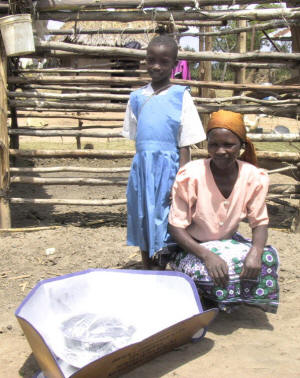 “Sunny
solutions for real.” This is how stakeholders described SCI’s involvement
in Nyakach, Kenya, which
wound down last summer. They reeled out a list of benefits, demonstrating the
numerous ways solar cookers enrich their lives. An independent review in July
2008 further validated many of their comments. Over the course of five years
in Nyakach, a total of 3,154 solar
CooKits were purchased,
impacting the lives of approximately 113,500 people in this impoverished community.
“Sunny
solutions for real.” This is how stakeholders described SCI’s involvement
in Nyakach, Kenya, which
wound down last summer. They reeled out a list of benefits, demonstrating the
numerous ways solar cookers enrich their lives. An independent review in July
2008 further validated many of their comments. Over the course of five years
in Nyakach, a total of 3,154 solar
CooKits were purchased,
impacting the lives of approximately 113,500 people in this impoverished community.
Benefits included:
- Reduced pressure on women and children, especially girls, from constant firewood gathering
- Increased self esteem amongst households using solar cookers
- Increased productivity in farms, businesses, schools, etc. due to less time spent on firewood collection
- Reduced fuel expenditures by over 45%
- Direct and indirect employment opportunities
- Reduced incidence of smoke- and water-related illnesses
- Improved local environment due to less charcoal and firewood use
- Enhanced community knowledge of renewable energy sources
Calling all U.S. federal employees!
 Are
you a federal employee? Do you know one?
Solar Cookers International
(SCI) has again qualified as a participating organization in the Combined Federal
Campaign (CFC). SCI is a beneficiary of the effort through the Aid for Africa
Federation. We are proud to meet the rigorous financial, accountability, and
governance standards, and ask for your CFC support. Federal employees have the
option of supporting SCI with either a one-time gift or with recurring payroll
deductions. For those interested in joining the effort, our CFC number is 11023.
This code directs your donation to SCI’s Africa programs. Information is available
on-line at http://aidforafrica.org/members.php?id=43.
Your questions are also welcomed by SCI Resource Development Coordinator Rene
Hamlin. You can reach her by telephone: (916) 455-4499, or e-mail:
rene@solarcookers.org. Thanks, federal
employees, for your philanthropy and involvement in the effort to spread this
sustainable solar solution.
Are
you a federal employee? Do you know one?
Solar Cookers International
(SCI) has again qualified as a participating organization in the Combined Federal
Campaign (CFC). SCI is a beneficiary of the effort through the Aid for Africa
Federation. We are proud to meet the rigorous financial, accountability, and
governance standards, and ask for your CFC support. Federal employees have the
option of supporting SCI with either a one-time gift or with recurring payroll
deductions. For those interested in joining the effort, our CFC number is 11023.
This code directs your donation to SCI’s Africa programs. Information is available
on-line at http://aidforafrica.org/members.php?id=43.
Your questions are also welcomed by SCI Resource Development Coordinator Rene
Hamlin. You can reach her by telephone: (916) 455-4499, or e-mail:
rene@solarcookers.org. Thanks, federal
employees, for your philanthropy and involvement in the effort to spread this
sustainable solar solution.
Solar Cooker Review is published two or three times per year with the purpose of presenting solar cooking information from around the world. Topics include solar cooker technology, dissemination strategies, educational materials, and cultural and social adaptations. From time to time we cover related topics such as women’s issues, wood shortages, health, nutrition, air pollution, climatic changes, and the environment.
The Review is sent to those who contribute money or news about solar cooking projects. The suggested subscription price is $10/year. Single copies are sent free to select libraries and groups overseas.
We welcome reports and commentary related to solar cooking for possible inclusion. These may be edited for clarity or space. Please cite sources whenever possible. We will credit your contribution. Send to Solar Cookers International (SCI), 1919 21st Street #101, Sacramento, California 95811-6827, USA. You may also submit by fax: +1 (916) 455-4498 or e-mail: kevin@solarcookers.org.
The Review is compiled and edited by Kevin Porter, SCI’s education resources
director, with assistance from other staff. Layout is graciously donated by
IMPACT Publications located in
SCI is a 501(c)(3) nonprofit organization assisting communities in using the power of the sun to cook food and pasteurize water for the benefit of people and environments. SCI is a member of InterAction. We do not sell, rent or trade names of our donors. Tax ID # 68-0153141.
The Review is available online at www.solarcooking.org/docs.htm#newsletters.
2008 Board of Directors
Robert Metcalf, PhD, Jack Blanks, Virginie Mitchem, Patt Hull, Gabriele Simbriger-Williams, Sue Corbett, Joseph Huma, Sotiris Kolokotronis, Edye Kuyper, Arline J. Lederman, Patricia McArdle, James Moose, LLP, Michael Mora, and Dawit Tadesse, PhD
_small.jpg)